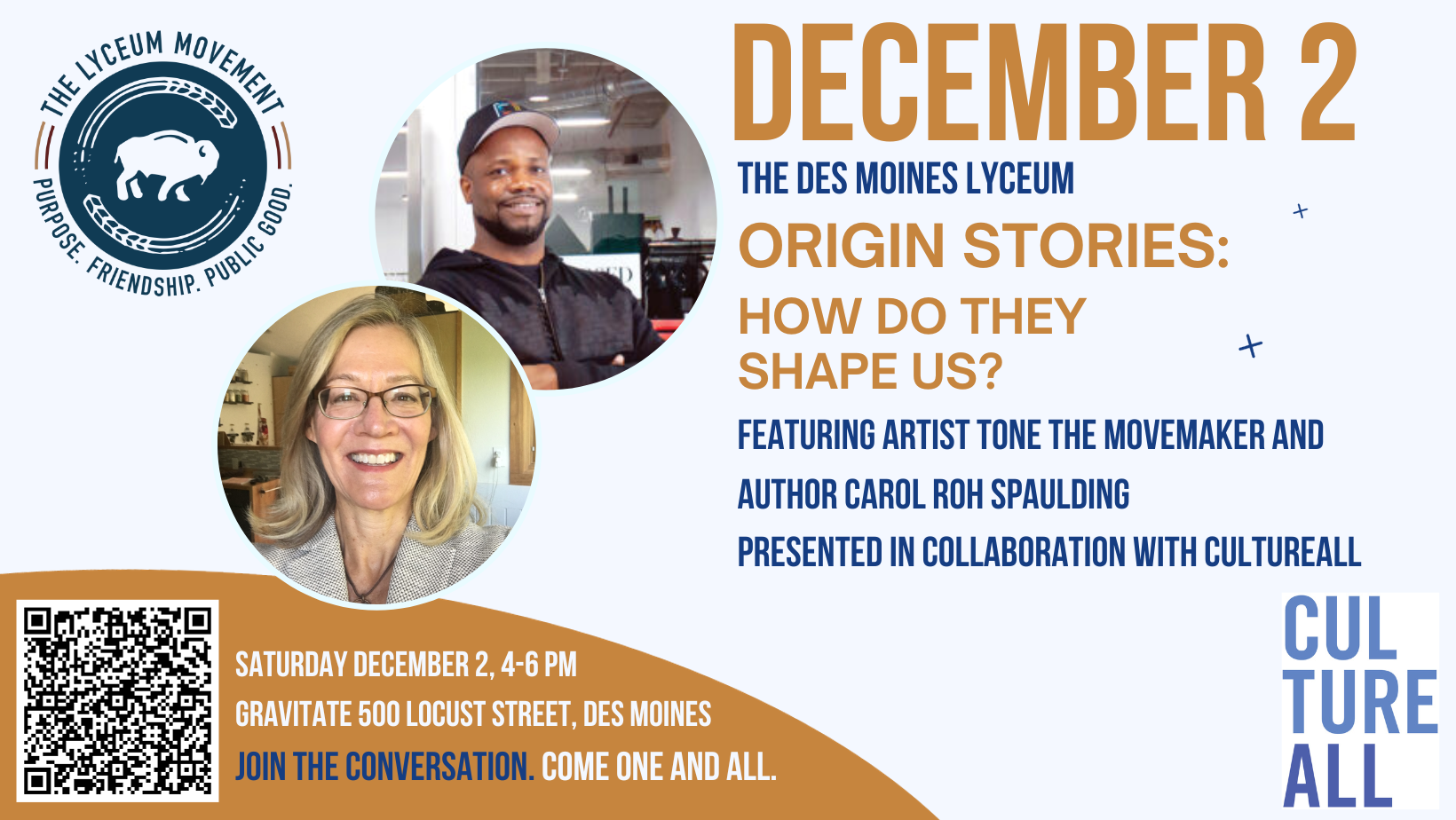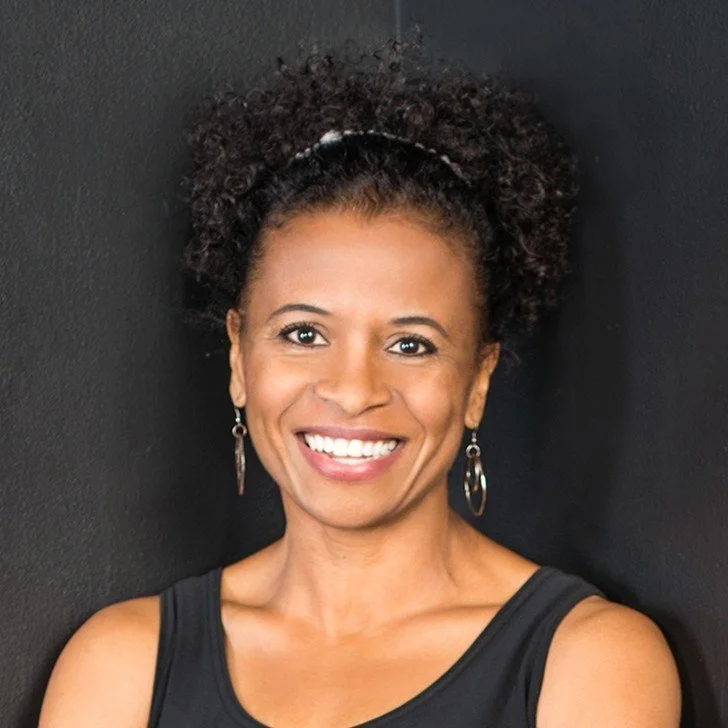
Events
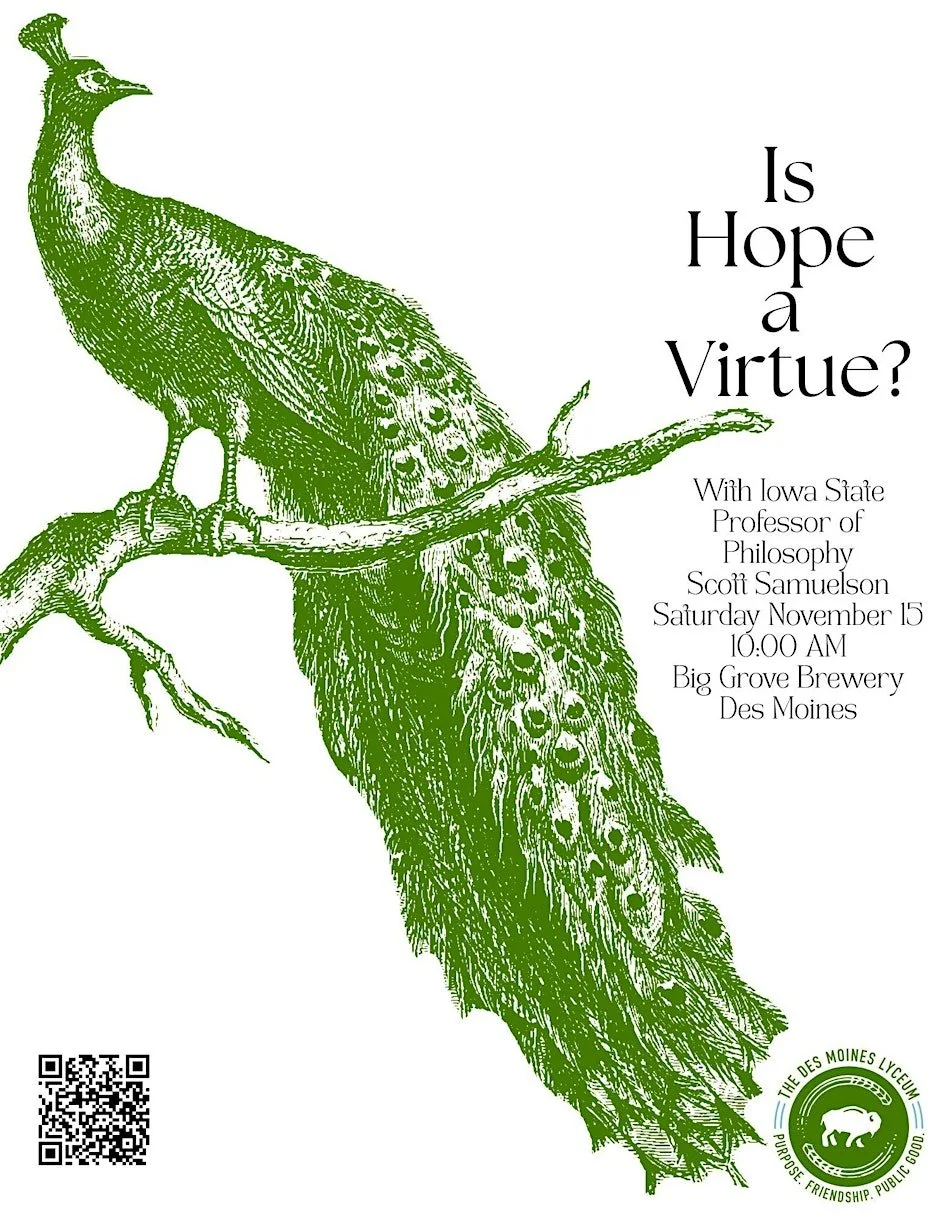
Is Hope a Virtue?
Today, many people find it easy to be cynical. Is hope foolish and irrational, or is it a virtue we need?
Scott Samuelson, philosopher at Iowa State, and beloved lecturer, will explore the topic of hope in a three part series on the place of faith, hope, and love in the world today.
Scott is the author of several acclaimed books, including The Deepest Human Life and Rome as a Guide to the Good Life. He has been published in The Atlantic, Washington Post, and other outlets.
Time: Saturday, December 13, 2025
11:00 AM - 12:30 PM
Location: Big Grove Brewery & Taproom
555 17th Street, Des Moines, IA, 50309, United States

Lecture — Is Faith a Virtue?
Virtues are positive character traits, sometimes even heroic traits, such as justice, courage, wisdom, and mercy. Virtues make people capable of extraordinary achievements, so what about faith? It’s part of the trio of great religious virtues of faith, hope, and love in the western tradition, but what’s the point of having it? Is faith just about blind belief for religious people, or is there something deeper and human about this all-too-familiar notion.
Dr. Scott Samuelson, philosopher at Iowa State, and beloved lecturer, will explore this question as part of a three part series on the place of faith, hope, and love in the world today.
Scott is the author of several acclaimed books, including The Deepest Human Life and Rome as a Guide to the Good Life. He has been published in The Atlantic, Washington Post, and other outlets.
Date: Saturday, November 15, 2025
10:00 AM - 11:30 AM
Location: Big Grove Brewery & Taproom
555 17th Street
Des Moines, IA 50309
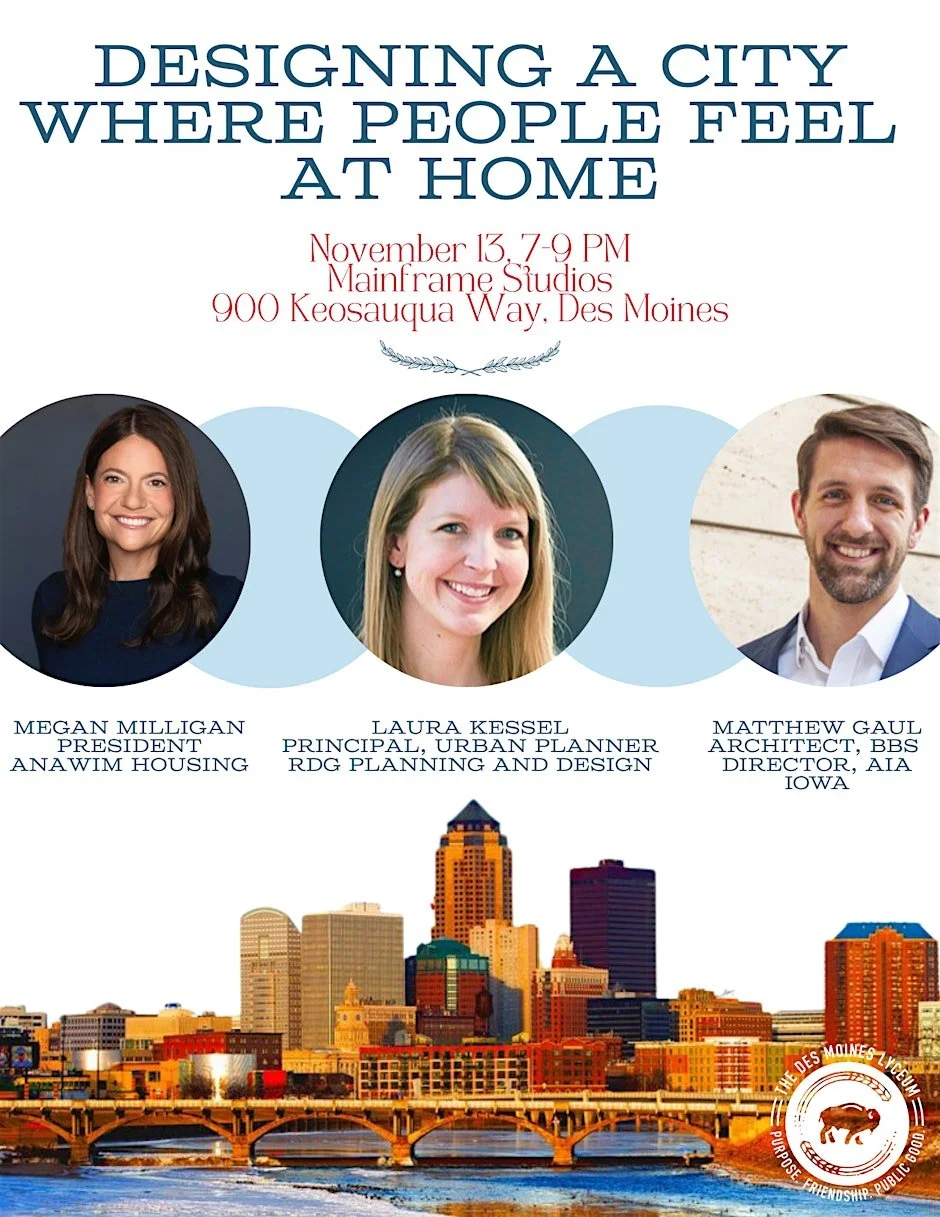
Designing a City Where People Are at Home
Modern cities can leave many residents feeling alienated. How can architecture and design shape a city in ways that promote community and human flourishing? What should be the priorities in city design? Do aesthetics really matter? What about a sense of place? How does all of this affect our neighbors who are without housing?
Join this panel of three leading Iowa experts in architecture, planning, and housing for the houseless.
Time: Thursday, November 13, 2025
7:00 PM - 9:00 PM
Location: Mainframe Studios, Room 108
900 Keosauqua Way, Des Moines, IA, 50309, United States

Does Character Matter?
When considering who to put into leadership, should we look more at character, or more at results? Does one imply the other? Can someone be a good leader, but a moral failure in their personal life? These are questions always worth asking in a democracy, where leadership depends on our backing.
Existentialism for the 21st Century
Session 4: Gabriel Marcel on Technology and the Mystery of Being Present
One of the most significant religious existentialists, the French philosopher
Gabriel Marcel argues that humanity is now at the mercy of its technology:
we serve what is supposed to serve us. This session will examine why he
believes that we fall into the trap of technology and how we should open
ourselves to a great mystery: the mystery of being present to ourselves, the
people around us, our creativity, and existence itself.
_____________________________________________________
On this Series: Existentialism, one of the most engaging and important philosophical
movements of the nineteenth and twentieth centuries, has special
relevance for the twenty-first century. Its central concerns include dealing
with anxiety, preserving humanity in the face of powerful technologies, and
figuring out how to be free in a messy world. Join the award-winning
philosopher and author Scott Samuelson for any or all of four
sessions—each a lecture with a discussion period afterward—on key
existentialist philosophers and how they can guide us to live more
authentically.
Existentialism for the 21st Century
Session 1: Søren Kierkegaard on Anxiety and Being Human
The brilliant and influential Danish philosopher Søren Kierkegaard once
observed, “Whoever has learned to be anxious in the right way has learned
the ultimate.” This session will explore why he believes that we need to
think of anxiety as more than a disorder and how we can live with anxiety in
a way that brings out our true humanity.
This series will take place over four sessions in April. Tickets are available for individual sessions or for the entire series at a discount.
_____________________________________________________
On this Series: Existentialism, one of the most engaging and important philosophical
movements of the nineteenth and twentieth centuries, has special
relevance for the twenty-first century. Its central concerns include dealing
with anxiety, preserving humanity in the face of powerful technologies, and
figuring out how to be free in a messy world. Join the award-winning
philosopher and author Scott Samuelson for any or all of four
sessions—each a lecture with a discussion period afterward—on key
existentialist philosophers and how they can guide us to live more
authentically.

April Lyceum: The Philosophy that Made America
Announcement April 5:
Due to inclement weather, this afternoon’s event is cancelled. We regret that we won’t be able to get together.
Please join us for the rest of April on Saturday mornings for our series on Existentialism in the 21st century with Dr. Scott Samuelson.
Note: Please note that we’ll be in a different location than our normal spot at Gravitate for April’s Big Conversation in Des Moines.
Join two leading legal and political science experts to discuss the philosophy that shaped our constitution and how it shapes us today.
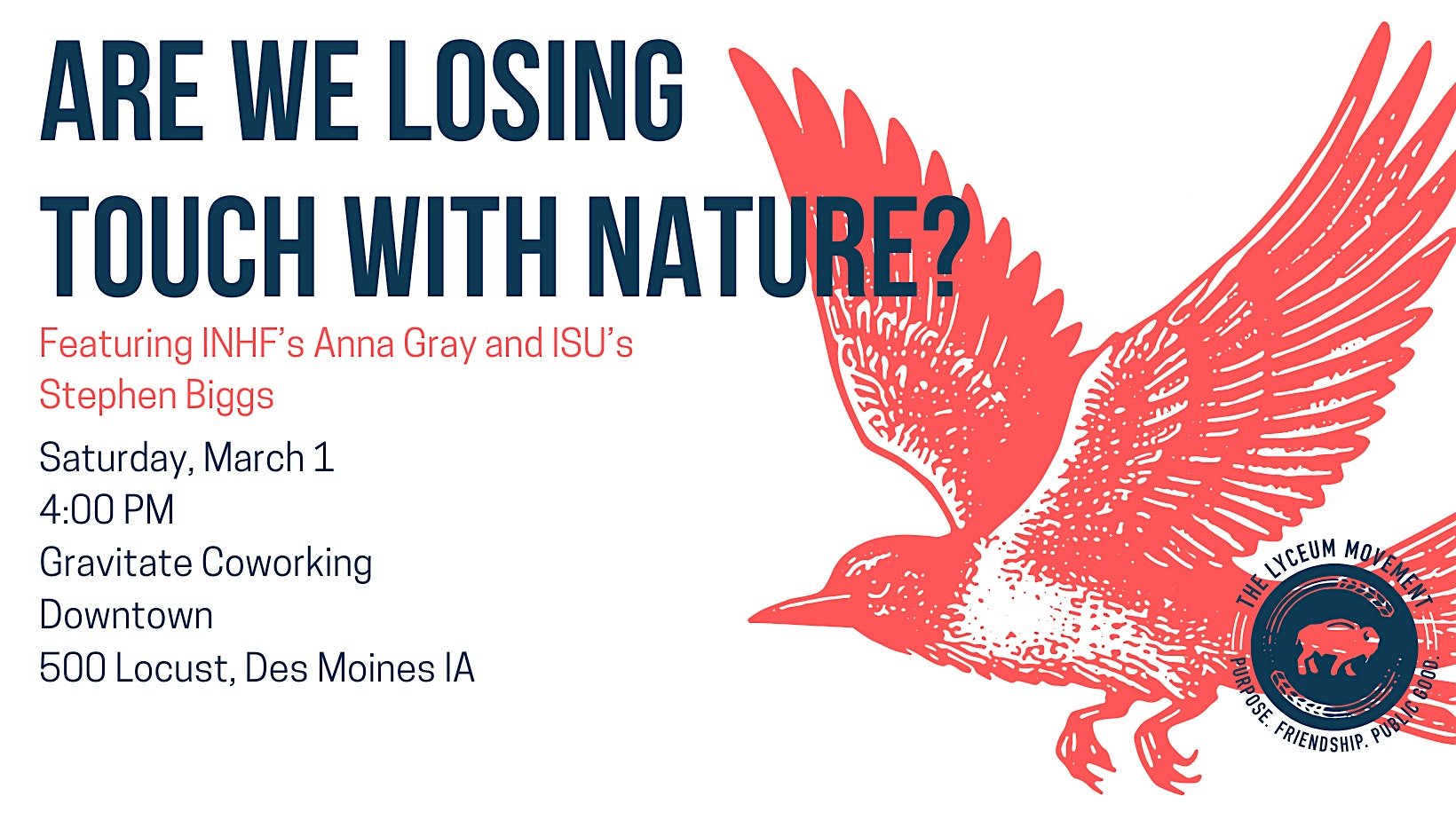
March Lyceum: Are We Losing Touch with Nature?
As developing technologies promise to remove more and more friction from our life, are we losing touch with reality?
Join our conversation with Anna Gray, Public Policy Director and Counsel at the Iowa Natural Heritage Foundation, and Dr. Stephen Biggs, Associate Professor of Philosophy at Iowa State University.

February Lyceum: What's the Point of College?
With higher education getting so expensive, it's a good time to ask: what is the point? Seeking wisdom? Training laborers? Credentialing?
Join us to discuss this and more with Dr. Scott Samuelson, philosophy professor at Iowa State University.
Additional speakers to be announced soon.

January Lyceum: What's the Point of America?
As a new Chief Executive is inaugurated, it's an apt time to ask: what is the point of America? Does our country have a national purpose? How well are we living up to that purpose, and how can we do so better?
Join us to discuss all things in deep political thinking with State Auditor Rob Sand, Chair and Professor in Political Science at Iowa State Dr. Alex Tuckness, and state Representative Brett Barker.

I Beauty Just in the Eye of the Beholder?
We often hear that "art is just subjective" or "just self-expression." Yet most of us feel that some art is better than others, and believe our preferences are based in the real qualities of the things we enjoy, and not just in arbitrary, subjective feelings.
So what is the relationship between objective quality and subjective experience? how we answer that question affects not just what gets included in our museums, but in how we shape the world in which we live. Who decides what sculptures get put downtown? Are there better and worse ways for buildings and streets to look? Is some art just bad?
Join us to discuss these fascinating questions Saturday, November 23! Sarah Kyle, Chair of the Department of Art and Visual Culture at Iowa State, who is an expert in Italian Renaissance art, will join us, alongside Mark McInroy, professor at the University of Saint Thomas, who specializes in the philosophy of beauty.

The Great Ideas: Laozi and How to Harness the Dao
Exploring Great Ideas: Gardening the Soul
Join us for this series of six sessions, led by the award-winning philosopher Scott Samuelson, on the greatest ideas of ancient Greco-Roman and Chinese philosophy for living a flourishing life. Each session will begin with a brief but comprehensive lecture on one great idea and then move into conversation and exploration of it. No preparation or prior knowledge is required.
Session Six: Laozi on Harnessing the Power of the Dao
Laozi (a.k.a. Lao Tzu) is the founder of Daoism (a.k.a. Taoism), one of the most mysterious and profound of all philosophies. We’ll explore his understanding of the way of all things and how we can tap into it to harness our powers for success in any walk of life.
Scott Samuelson is a prominent professor of philosophy, with writing in the Atlantic, Wall Street Journal, and other major outlets. He is the author of Rome as a Guide to the Good Life, Seven Ways of Looking at Pointless Suffering, and The Deepest Human Life.
No prior knowledge or reading required. This is your chance to get to know the thinkers and ideas.
Register here!

Session 5: Mencius on Culitivating our Humanity
Session Five: Mencius on Cultivating the Sprouts of Our Humanity
Second only to Confucius in the history of Confucianism, Mencius (Mengzi) famously argues that humanity is fundamentally good—but that we must cultivate the sprouts of our humanity in the way that a good gardener cultivates a garden. We’ll examine those fundamental potentials of who we are and how we might go about making them blossom.

The Great Ideas: Confucius on the Important of Ritual
Exploring Great Ideas: Gardening the Soul
Join us for this series of six sessions, led by the award-winning philosopher Scott Samuelson, on the greatest ideas of ancient Greco-Roman and Chinese philosophy for living a flourishing life. Each session will begin with a brief but comprehensive lecture on one great idea and then move into conversation and exploration of it. No preparation or prior knowledge is required.
Session Four: Confucius on the Importance of Ritual Propriety
The most influential figure in the long history of Chinese culture, Confucius (Kongzi) put his finger on something often overlooked in Western philosophy: the importance of ritual propriety for living together humanely. We’ll explore how treating others with respect and hospitality is necessary for a humane life and a good community.
Scott Samuelson is a prominent professor of philosophy, with writing in the Atlantic, Wall Street Journal, and other major outlets. He is the author of Rome as a Guide to the Good Life, Seven Ways of Looking at Pointless Suffering, and The Deepest Human Life.
No prior knowledge or reading required. This is your chance to get to know the thinkers and ideas.
Register here!

The Great Ideas: Epictetus the Stoic on Accepting What We Can’t Control
Exploring Great Ideas: Gardening the Soul
Join us for this series of six sessions, led by the award-winning philosopher Scott Samuelson, on the greatest ideas of ancient Greco-Roman and Chinese philosophy for living a flourishing life. Each session will begin with a brief but comprehensive lecture on one great idea and then move into conversation and exploration of it. No preparation or prior knowledge is required.
Session Three: Epictetus on Accepting What We Can’t Control
The philosophy of Stoicism is currently making one of its periodic comebacks, attracting leading figures in business and politics as well as scores of people longing to overcome the anxieties of contemporary life. We’ll explore how the ancient Roman Stoic—and former slave—Epictetus found not only happiness but power and freedom in the acceptance of what we can’t control.
Scott Samuelson is a prominent professor of philosophy, with writing in the Atlantic, Wall Street Journal, and other major outlets. He is the author of Rome as a Guide to the Good Life, Seven Ways of Looking at Pointless Suffering, and The Deepest Human Life.
No prior knowledge or reading required. This is your chance to get to know the thinkers and ideas.
Register here!

The Great Ideas: Epicurus on Finding Joy in Simplicity
Exploring Great Ideas: Gardening the Soul
Join us for this series of six sessions, led by the award-winning philosopher Scott Samuelson, on the greatest ideas of ancient Greco-Roman and Chinese philosophy for living a flourishing life. Each session will begin with a brief but comprehensive lecture on one great idea and then move into conversation and exploration of it. No preparation or prior knowledge is required.
Session Two: Epicurus on Finding Joy in Simplicity
No philosopher has given a more penetrating account of the nature of desire than the ancient Greek thinker Epicurus, who cultivated a unique way of simple living that still attracts adherents. We’ll examine his powerful ideas about how our desires can get out of hand and how we can harness them to make the most of the time we have.
Scott Samuelson is a prominent professor of philosophy, with writing in the Atlantic, Wall Street Journal, and other major outlets. He is the author of Rome as a Guide to the Good Life, Seven Ways of Looking at Pointless Suffering, and The Deepest Human Life.
No prior knowledge or reading required. This is your chance to get to know the thinkers and ideas Register here!

The Great Ideas: Aristotle and What it is to Live an Excellent Life
Exploring Great Ideas: Gardening the Soul
Join us for this series of six sessions, led by the award-winning philosopher Scott Samuelson, on the greatest ideas of ancient Greco-Roman and Chinese philosophy for living a flourishing life. Each session will begin with a brief but comprehensive lecture on one great idea and then move into conversation and exploration of it. No preparation or prior knowledge is required.
Session One: Aristotle on Virtue as the Golden Mean
One of the most influential thinkers who has ever lived, Aristotle spells out the central idea of Greco-Roman philosophy: the key to the good life lies in cultivating the virtues, the excellences of our character. We’ll examine his timeless ideas about the nature of virtue and how to develop it in ourselves.
Scott Samuelson is a prominent professor of philosophy, with writing in the Atlantic, Wall Street Journal, and other major outlets. He is the author of Rome as a Guide to the Good Life, Seven Ways of Looking at Pointless Suffering, and The Deepest Human Life.
No prior knowledge or reading required. This is your chance to get to know the thinkers and ideas. Register here!

Power, Money, and Corruption in the Food Industry: A Conversation with Austin Frerick
Renowned author and Iowan Austin Frerick joins the Lyceum to discuss his new book, Barons. Every wonder why grocery prices fluctuate so much, why farms became factories, what’s going on with biofuels? Join Austin to consider these questions here in the heart of America’s food belt.


Is There Hope for Civility
We've all felt a growing tension in our public life. Name-calling and outrage seem to be the order of the day. In a time with deep disagreements, how can we navigate our life together as a community, state, and nation?
Featuring Iowa Democratic Senator Nate Boulton, and Greene County Attorney and political scientist Tom Laehn.
Join the conversation!
Tickets here.

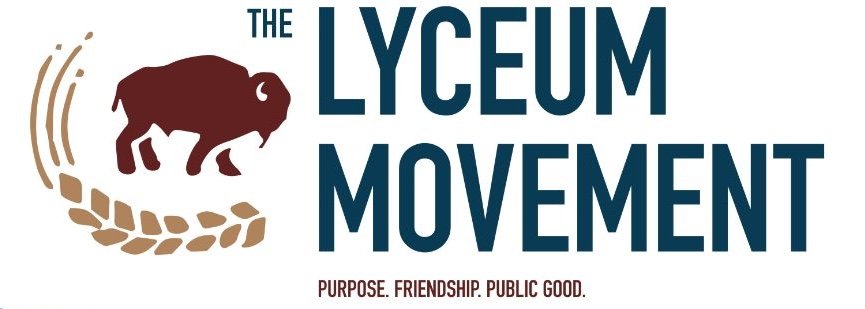
What Will Artificial Intelligence Do to Us?
Artificial intelligence is being employed in a myriad of ways. We are familiar with software that will write essays for us or search up information, but it’s also being used to conduct experiments, to create art for television, and many other things besides. Some have even proposed creating AI “companions” for the elderly. What will these new technologies do to us? How should we think about them? How do we make sure we aren’t losing important human values to these new machines?
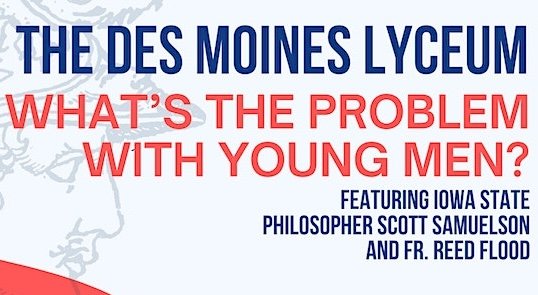
Is there a Problem with Young Men?
Join Iowa State philosopher Scott Samuelson and other Fr. Reed Flood, as we look into the crisis facing America's young men. What's causing these challenges and what are the hopes for facing them?
Join the conversation by reserving your spot today!
Origin Stories: How Does Where We Come From Shape Who We Are?
We have stories about our lives. How important are those stories? Do a story have to involve high drama to matter? We’ll discuss the importance of origin stories with local Des Moines artists Tone the MoveMaker and Carol Roh Spaulding.

What Do We Owe Our Local Environment?
Join us at Gravitate Coworking downtown for another great evening of conversation on the question "What do we owe our local environment?" Our livelihoods and communities exist and draw from the land, air, and water among which they were built. What is unique about our local natural environment, what endangers it, what can we do to preserve and enhance it for the next generation?
We're joined by Shane McQuillan, City Forester for Des Moines, who has worked in environments as varied as the Australian outback and Chicago, Illinois, and by Tim Diebel, former Des Moines pastor turned organic farmer at Taproot Garden in Norwalk.
As always, fascinating conversation over beer and wine will ensue!
Register here

June 24: How the Shape of Our City Shapes Us
Our daily life is shaped by decisions about the physical landscape in which we live. City plans, real estate developers, and designers determine where and how things are built, what they look like, how easy they are to get to, what parts of the city are more important than others. How does the shape of our own city shape our behavior–does it contribute to our wellbeing and that of our family? Does it foster community life and a sense of shared purpose? Does it have a higher purpose than economic success? This month we will hear from decision makers about why our city is the way it is, and we will have the chance to talk about how it could change for the better.
Register here

How Will We Live with Artificial Intelligence?
Will it replace us? Is it conscious? Is it dangerous? Are we all overreacting?What makes us human?
Register here

Why Democracy?
Almost a hundred years ago, our predecessor, the Public Forum Movement, hosted an event with the title “Are We Done with Democracy?”. It was a historical moment in which many were reassessing the American democratic tradition. Communism, fascism, and other ideologies presented live alternatives to liberal democracy. It is always a question worth contemplating for Americans. Why democracy? What are the benefits and risks of our system? What kind of culture is necessary for democracy to work well?
Register here
https://www.eventbrite.com/e/why-democracy-tickets-598362948687

Do We Have Culture?
We use the word “Culture” in all kinds of ways. We talk about pop culture, workplace culture, political culture, culture war, and so much more. But what about the stories, artworks, songs, food, and more that make up our daily life? Do we feel like we have a rich local culture and identity? Why or why not? What is it like, what defines it? This will be an opportunity to hear from local cultural producers and for the community to talk among itself about what our own local culture really is.

Can We Have Heroes?
We are living in a time when so much is documented that we know the foibles and faults of all the people who are in the public eye and many of our historical figures have come under greater scrutiny. Can we still have heroes when we know so much of the faults of human beings? Do we need to have heroes? Why or why not?
Featuring Lily Okech and JJ Kappur
How Does Modern Media Change Us?
The fast-paced, endless scroll of TikTok, Twitter, and Instagram, the flood of cable TV news clips, and the constant stream of articles and headlines now fill our quiet moments. Whether in line at the store, between tasks at work, or lying awake at night, our experience of the world has been changed by modern media. The media critic Neil Postman famously argued that the way we receive information changes the way we think. How has modern media changed our own patterns of thought and behavior, for better or for worse? What should be our response to it?
Some Past Speakers

